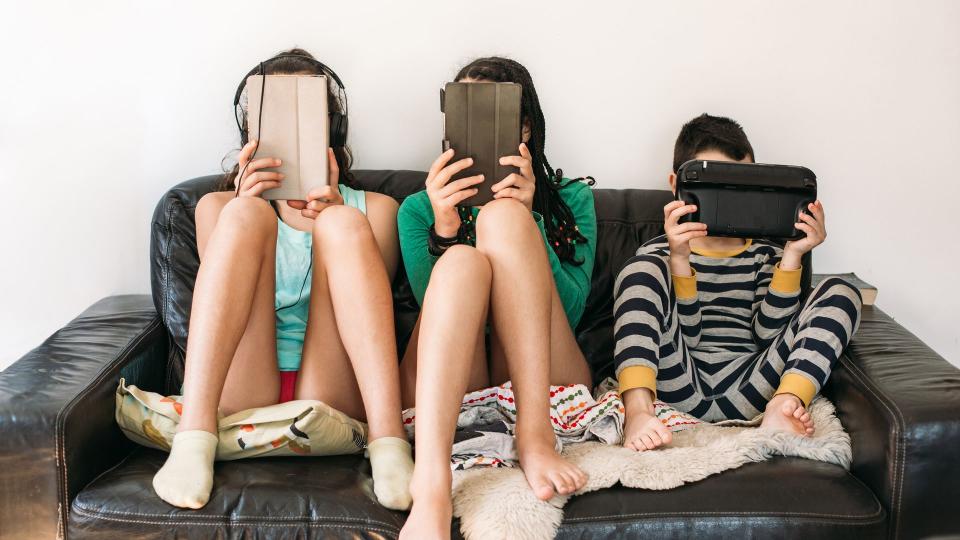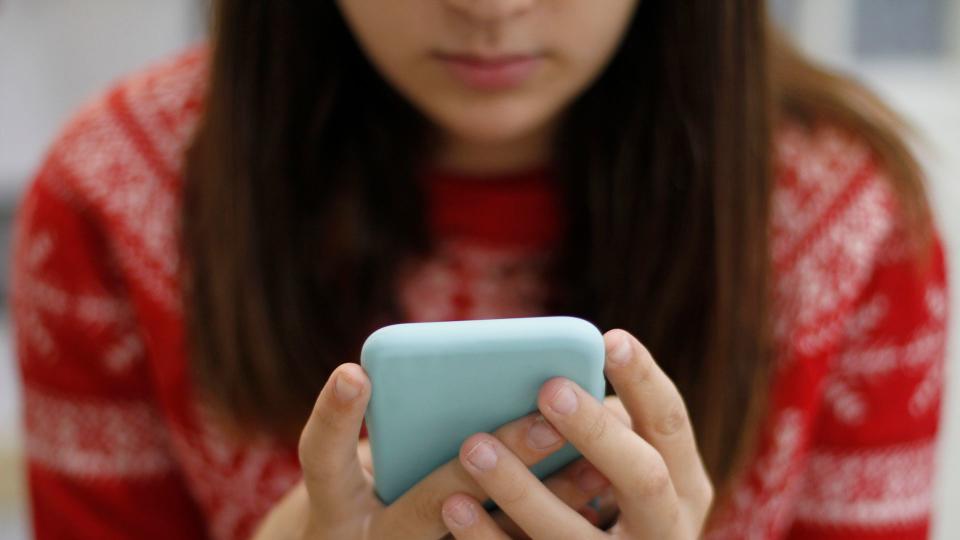Is your child addicted to being online? A counsellor reveals the mental health warning signs and how to help

Hands up if you have a child or teenager who spends a lot of time online, on social media or gaming?
As parents, we know that in 2024 the online world is part of life for our kids, but how much screen time is too much and how do we know if spending time online or on social media is adversely affecting them – and if it is, what do we do to help?
HELLO!spoke to Lee Hawker-Lecesne MBPsS, Lead Therapist and Addiction Counsellor at The Cabin, who gave us some great information and advice on the subject.

"Millennials tend to 'go' online but Generation Z 'live' online," he reveals.
"I don't think that's a bad thing, because they're a generation who've never known a time without the internet, so it's part of their reality. This generation is going to spend an inordinate amount of time using social media and going online because that's part of their world experience."
However, as we all know, there are drawbacks to this new online living, as Lee outlines.
"As we know, the internet is full of inauthenticity – and that's the problem. Young people don't come into the world knowing all the nuances of life and they can be easily led. When it comes to fake news, what's real and what's not? Young people can predicate their identities on what they see online without knowing that the majority of social media is so inauthentic.
"All addictions activate a part of the brain that stimulates the reward system. The person thinks, 'That makes me feel good, I like that', then there's an incentive to keep looking.
"They strive for those things but fall short of them, and that causes anxiety, which can lead to depression. Young people can be drawn into this world more and more." Read more from Lee below…
Online and social media addiction
It's a difficult thing to pin down what is too much screen time, but there are some obvious signs, symptoms and issues that crop up when someone is so immersed with being online, that it begins to affect their mental health and their capacity to function socially.
Addiction is often a very fear-based disorder. There's normally an organic underpinning but people aren't always genetically predisposed to become dependent on something.
In the context of addiction, I think social media is hugely anxiety-provoking for young people because it's based upon fallacy. A lot of what you see on social media isn't the truth – it's just somebody else's representation of what they want to be seen as. But if you're judging yourself against that, that can lead to all sorts of problems in terms of young people thinking they need to look a certain way or mimic something.
When you speak to addicts in treatment, they carry a huge amount of anxiety, a lot of fear and insecurity and that's particularly relevant in terms of internet addiction or social media addiction because there's that comparison.
If you take the physical representation of what the idealised person looks like, scrolling through images that have been filtered and touched up, it creates a false reality, and the expectation is that, 'I must achieve that in order to be accepted'. So, there's a fear of not being what the idealised standard has become.

Signs of online addiction
For young people this idealised standard is unattainable, so what you see with young people with internet addiction is a lot of anxiety and heightened stress, which manifests itself in behavioural changes, maybe shifts in their mood, they become more isolated, more argumentative – a moving away from reality as they are judging the real world based upon unreal representations and expectations.
You can see fluctuations in the temperament of the young person – so if they are normally quite easy going or compliant, they may become more oppositional, defiant or argumentative.
Behaviourally, these things tend to manifest in more and more screen time being needed. If you try and take the screen time away or limit it, it can create more frustrations and that comes out.
So excessive amounts of screen time is a sign, as well as replacing other activities and maybe friendships starting to suffer – less time with friends and more time isolating online.
Changes in sleep patterns is another classic. Staying up late or using social media before bed or using social media first thing in the morning. If you think about an alcoholic, the first thing they do in the morning is reach for a drink. You can start to see the parallels with turning your phone on first thing in the morning.
You may also like
MP Michelle Donelan celebrates the Online Safety Bill: 'It's a massive leap forward for children' MP Michelle Donelan celebrates the Online Safety Bill: 'It's a massive leap forward for children'
Mother-of-two Meghan Markle issues warning about child online safety Mother-of-two Meghan Markle issues warning about child online safety
How to prevent online addiction
We mustn't demonize the internet but the thing we need to realise about social media is that they want to engage you and you're battling against the algorithms built by scientists and psychologists to keep you looking at the screen.
For me personally, when we deliver any treatment for gaming or internet addiction, it's really about saying, 'Let's understand what you're up against. You think you're doing something that's quite motivational and engaging, but actually your behaviour is being steered by something that you don't fully understand.'
In terms of communicating with young people, there's nothing better than making the time to sit down, and not criticise or deride the internet, but from a critical thinking point of view say, 'What is social media? How does it work? Let's look at how it's put together and what its goals are.'
It's a fair conversation for parents to have, but the problem is that parents are very busy with raising children and there are economic pressures. Sometimes it's easier to let the child play on the phone or the gaming system rather than have to entertain them endlessly.
Parents can think it's harmless, but the more that young people are separated by their devices from face-to-face interaction and real-time relationships, the more that they slip into that other world. It can become a bit of a mess.
I think the starting point is education. This isn't about lecturing children or talking down to them but empowering them. You can say, 'Yes, as a Gen X or Millennial, you have lived in a different time to them, but their world fascinates you so can you talk about it?
It's not just talking about, 'What they are looking at on social media?'; the conversation can be steered away from the content to the functions of it. Children can research this and become thinkers themselves.
You can also have a type of family behavioural contract where you all agree to not use phones before or after a certain time, such as sitting down for breakfast together without phones at the table.
These are the little measures that improve young people's behaviour and improve self-control. Addiction is about a loss of self-control – it's about going with an urge or impulse, and the trouble with social media is that there's always the next link to press, which for young people erodes their impulse control.
So, putting in some kind of behavioural control is good. For example, for every hour of screen time, there's an hour of family time. You have to commit to doing that yourself though – you can't have a double standard.

How to help if there is a problem
If your child is exhibiting signs of mood changes or behavioural difficulties, it's ok to be more open minded about where they get their support. It doesn't need to be in a psychologist's office. Young people nowadays are much more articulate and there's more availability in terms of online support.
Having the conversation about getting support does come back to understanding what the problem is and addressing the room of the problem. It requires time, intuition and availability from the parent to have that conversation. It's all about tone and compassion and not labelling them.
The reason people use social media is to find acceptance and connection, so if you say that you're detecting something that makes them different or other, that can be difficult.
You can say, 'You used to enjoy doing this but now you don't enjoy it as much, is there anything that we can do to change that? Is there a conversation that you need to have where you can talk to someone about that?' These are all ways of approaching it rather than saying, 'Stop doing that or don't behave like that'. That language sets a tone that's quite punitive.
You could explore an app with your child that provides one-to-one counselling for children can be useful, with simple exercises or routines that they can engage in.
Young people can seek help via Young Minds here





